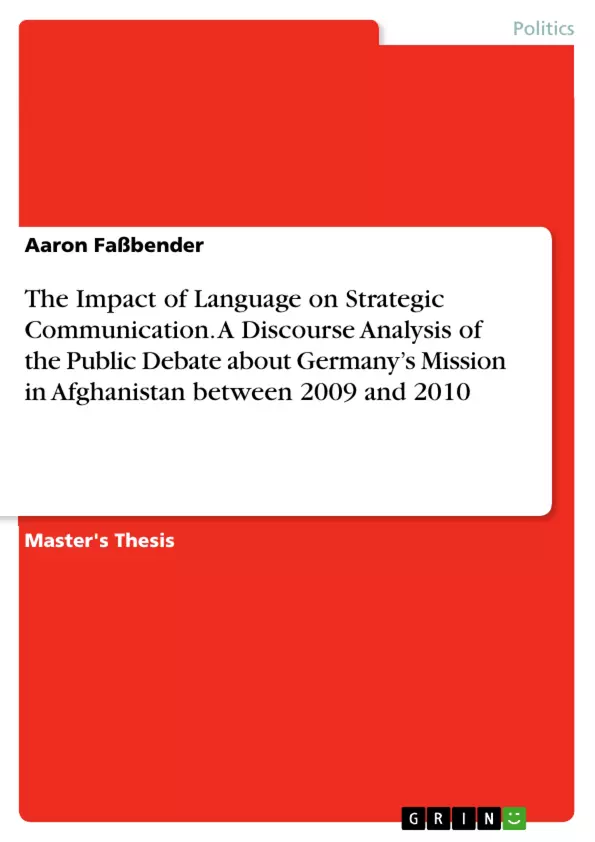The thesis examines how language shaped the public discourse concerning the German ISAF mission between 2009 and 2010. It focuses on the political and strategic communication concerning the German contribution to the mission.
This paper examines a variety of definitions of war and discusses their applicability for the ISAF mission in Afghanistan. Although traditional, state-centered definitions of war are still relevant in legal respects, today inter-state wars between two belligerent states are the exception. Therefore, to be useful any definition of wars have to emphasise the effects of warfare and cover inter-state wars, and intra-state wars.
After a series of incidents in Afghanistan, including the so-called Kunduz Airstrike and the Good Friday Battle, German Defence Minister Karl-Theodor zu Guttenberg described the security situation in Afghanistan as “kriegsähnlich” (war-like). He later progressed to describing it as “war”. This started a controversial debate. Before his pronouncements, the neutral term “Stabilisierungseinsatz” (stabilisation mission) was in official use. His actions stirred debate amongst the press and politicians in Germany about the International Security Assistance Force (ISAF) mission. This debate centred on the political and military objectives in Afghanistan and the label of war.
Inhaltsverzeichnis (Table of Contents)
- One Introduction.
- 1. Preface
- Two Literature Review
- 2.1 Introduction....
- 2.2 Definitions of War
- 2.2.1 Traditional Definitions of War...
- 2.2.2 New Wars
- 2.3 The Media at War
- 2.3.1 Media coverage during the Cold War.
- 2.3.2 Television Wars.
- 2.3.3 The Media and the Global War on Terror.......
- 2.3.4 New Media in Conflicts.
- 2.4 Conclusion
- 2.4.1 The Usability of the Term War.
- 2.4.2 The German Media and the ISAF Mission
- Three - Methodology
- 3.1 Introduction......
- 3.2 Epistemological Stance
- 3.3 Research Methods.
- 3.3.1 Discourse Analysis...
- 3.2.2 Semi-structured Interviews.
- 3.4 Ethical Considerations
- 3.5 Limitations of the Research
- Four Findings..
- 4.1 Introduction....
- 4.2 \"Stabilisierungseinsatz” (2002-2008).
- 4.3 Kunduz Airstrike (9 September 2009) ..
- 4.4 War and War-like Conditions.
- 4.5 Adapted Goals and Messages
- 4.5.1 End State vs. End Date...........
- 4.6 Outcomes of the changed Strategic Communication ......
- Five Conclusion.......
- 5.1 Introduction.......
- 5.2 Key Findings..
- 5.3 Conclusions and Recommendations
- 5.4 Areas for Further Research
Zielsetzung und Themenschwerpunkte (Objectives and Key Themes)
This thesis examines the impact of language on strategic communication surrounding the German ISAF mission in Afghanistan between 2009 and 2010. It focuses on how the term "war" and the subsequent public debate shaped the German government's approach to the mission.
- The role of language in shaping public discourse and perceptions of military operations.
- The relationship between strategic communication, political objectives, and military operations.
- The impact of media coverage on public opinion and government policy.
- The evolution of definitions of war in a contemporary context, particularly with regard to non-state actors and asymmetrical warfare.
- The interplay between policy makers, the media, and military actors in the construction of public narratives about conflict.
Zusammenfassung der Kapitel (Chapter Summaries)
- One Introduction: Provides an overview of the research topic, its significance, and the structure of the thesis.
- Two Literature Review: Explores various definitions of war, including traditional state-centric definitions and contemporary approaches to "New Wars". It examines the role of the media in conflicts, particularly the impact of television and new media technologies on public perception. This chapter concludes with a discussion about the German media's coverage of the ISAF mission in Afghanistan.
- Three - Methodology: Outlines the research methods employed in the thesis, which include discourse analysis of press coverage and semi-structured interviews with key figures involved in the ISAF mission. It also addresses ethical considerations and potential limitations of the research.
- Four Findings: Presents an analysis of the strategic communication surrounding the ISAF mission in Afghanistan, examining the use of terms such as "Stabilisierungseinsatz" (stabilisation mission) and "war" in shaping public discourse. This chapter explores the impact of specific events, such as the Kunduz Airstrike, on the public narrative about the mission.
Schlüsselwörter (Keywords)
This thesis focuses on the crucial concepts of strategic communication, language, and war in the context of the German ISAF mission in Afghanistan. It examines the interplay between public discourse, political objectives, and military operations, highlighting the impact of media coverage and evolving definitions of war in shaping public perception and policy decisions.
Frequently Asked Questions
How did the terminology for the German mission in Afghanistan change over time?
It shifted from the neutral term "Stabilisierungseinsatz" (stabilization mission) to "kriegsähnlich" (war-like) and eventually to "war" under Defense Minister zu Guttenberg.
What was the impact of the Kunduz Airstrike on strategic communication?
The 2009 incident acted as a catalyst for a more controversial public debate, forcing a reassessment of how the mission's risks and nature were communicated to the German public.
Why is the definition of "war" problematic in the context of ISAF?
Traditional definitions focus on inter-state conflict, whereas ISAF involved asymmetrical warfare against non-state actors, fitting the "New Wars" paradigm better.
How does media coverage influence military strategic communication?
The thesis explores how media narratives can shape public opinion, which in turn pressures political leaders to adapt their goals and messaging regarding military deployments.
What research methods were used in this discourse analysis?
The study employed discourse analysis of press coverage and semi-structured interviews with key figures involved in the mission between 2009 and 2010.
- Citation du texte
- Aaron Faßbender (Auteur), 2017, The Impact of Language on Strategic Communication. A Discourse Analysis of the Public Debate about Germany’s Mission in Afghanistan between 2009 and 2010, Munich, GRIN Verlag, https://www.grin.com/document/1130733



